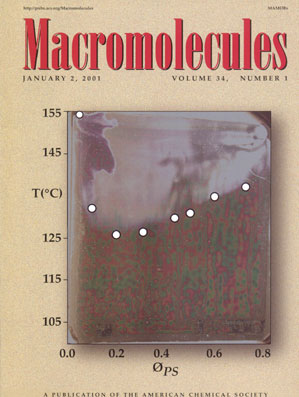"Highly Stereoselective Ruthenium-Catalyzed Ring-Opening Metathesis Polymerization of 2,3-Difunctionalized Norbornadienes And Their 7-Oxa Analogues"
Lionel Delaude, Albert Demonceau, and Alfred F. Noels
 |
source: Macromolecules
year: 1999
volume: 32
first page: 2091
last page: 2103
doi: 10.1021/ma9812783
|
Abstract: The ring-opening metathesis polymerization (ROMP) of 2,3-difunctionalized norbornadienes and their 7-oxa analogues catalyzed by [RuCl2(p-cymene)]2 in the presence of trimethylsilyldiazomethane (TMSD) yields high-trans, highly tactic polymers. A tentative mechanism involving arene loss, carbene formation, and monomer chelation is presented. The ROMP of 2,3-dicarbomethoxynorbornadiene served as a test reaction to investigate the influence of the various experimental parameters (reaction time and temperature, nature of the solvent and catalyst, and TMSD initiation conditions). An all-trans, highly tactic (>79%) polymer was obtained under a wide variety of conditions. Strikingly, the addition of tricyclohexylphosphine had a detrimental influence on the polymerization yield and stereoselectivity. The procedure was successfully applied to various other 2,3-dicarboalkoxynorbornadienes, benzonorbornadiene, and their 7-oxa analogues. In the case of the diester monomers, an increase in the alkyl substituent size led to a decrease of the polymer trans content and tacticity. Because of the ruthenium catalyst's ready availability and marked resistance to oxygen and water, reactions were very easy to set up and to carry out.
[Full Text] [<< Previous Article] [Back to the List of Publications] [Next Article >>] l.delaude@ulg.ac.be